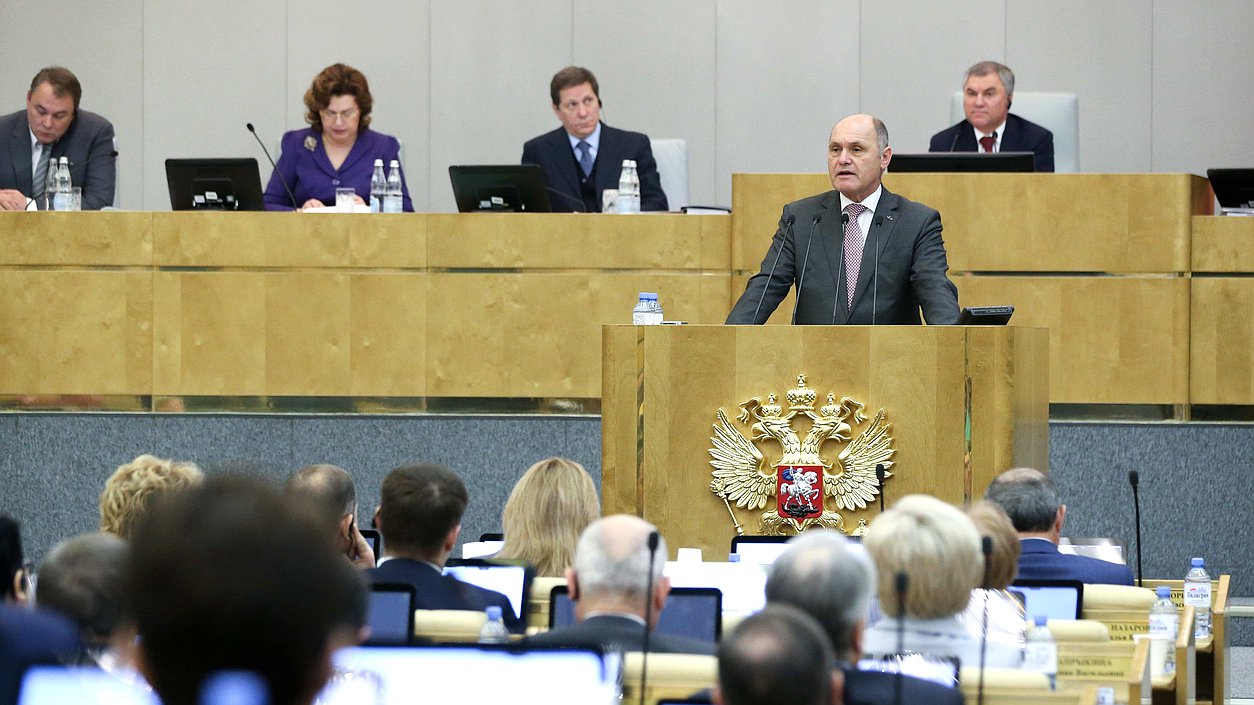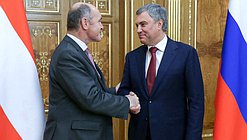
At the beginning of the speech, Wolfgang Sobotka thanked Chairman of the State Duma Viacheslav Volodin

Vyacheslav Victorovich
The Chairman of the State Duma of the Federal Assembly of the Russian Federation of the eighth convocation. Elected in single mandate constituency № 163 (Saratov constituency - Saratov Oblast)
for the invitation to pay a visit to Russia, “which fits into the long tradition of visits between the chambers of our parliaments.” He stressed the intention to intensify inter-parliamentary relations on a bilateral basis.
Inter-parliamentary interaction
The head of the National Council noted that the task of the parliamentarians of the two countries is to expand and strengthen cooperation between parliaments.
“I am very pleased that at the winter session of the OSCE PA, which will be held in Vienna in February 2019, we will welcome the Russian delegation,” he said.
“We value Russia as a partner because it is a world power, it is an important actor in the international arena, which actively participates in all processes,” said Wolfgang Sobotka.
He reminded that in June this year, the delegation of the Austrian National Council participated in the International Forum “Development of Parliamentarism”. “We try to cooperate at the parliamentary level whenever possible,” added the President of the National Council of the Republic of Austria.
The role of the USSR in the Second World War
Wolfgang Sobotka reminded that in 2018 two anniversaries have taken place.
The first is the 100th anniversary of the Republic of Austria, the establishment of the Austrian Parliament. The second date is “the beginning of a very dark period in our history — the Anschluss to Nazi Germany.” “We remember the crimes of National Socialism, but for a very long time, we pushed aside the degree of responsibility that Austria also bears. However, we realize that there were victims and criminals among the Austrians,” he said.
“I would like to separately note the role of the Soviet army, to thank from the bottom of my heart for this contribution and feat. It was the Soviet army that liberated Auschwitz camp on January 27th. It was the Soviet army that managed to liberate us,” said the President of the National Council of the Republic of Austria, adding that “after 10 years, Austria again fully gained its sovereignty. The Soviet leadership played its role. In 1955 it was a very bold step, which should be an example for us today.”
“As a historian, I have always been aware of what sacrifices your people made, what sufferings it underwent to liberate Austria and the whole world from National Socialism,” the head of the National Council emphasized.
He noted that political changes in Europe in the early 1990s, the end of the Cold War ”provided absolutely new, previously unexplored opportunities for our countries, and today our relations are more solid and richer than ever before.“
Dialogue between Russia and the European Union
“As a representative of a country that currently chairs the European Council, I want to say that it is necessary to develop relations that are now overshadowed by geopolitical tensions, including in connection with events in Ukraine,” said Wolfgang Sobotka.
“Austria has repeatedly and clearly indicated that we can imagine a change in the sanctions regime if the Minsk agreements are implemented. But, unfortunately, now we do not see any progress in this matter, the armistice in the Donbass is unsteady,” he said, stressing that the dialogue in the format of the Norman Quartet has no alternatives.
Speaking about the energy sector, the head of the National Council said that ”today Russia for the EU is one of the most important partners in the gas supply.“ “We are interested in the Nord Stream-2 project to ensure additional stability and security for the European Union,” he said.
Incident in the Kerch Strait
As Wolfgang Sobotka noted, the European Union and Austria demand observance of international law and urge both countries to do everything to reduce and prevent escalation. “The conflict in the Donbas has no military solution,” he stressed.
“It is even more important to resort to diplomacy, to negotiate and act in accordance with agreements within the OSCE,” the head of the National Council believes.
“Russia is a world power, an important partner,” he added, stressing that “Austria adheres to one position — a lasting peace in Europe is possible only with Russia, and not without, and certainly not against Russia. We are interested in you as a partner and member of the Council of Europe. We should be able to support interaction with the Russian delegation in the framework of the PACE. But nevertheless, there should be an open discussion in connection with tensions and incidents that we are seeing now.”
Interaction in the cultural sphere
See also
Wolfgang Sobotka called the development of cooperation in the cultural sphere an important aspect of bilateral relations. He reminded that in 2013 a series of “very successful cultural events” took place, 2017 was marked by tourism as it was the cross-year of Russia and Austria, and 2018 is the year of the Russian and Austrian music. The President of the National Council of the Republic of Austria informed about plans to make 2019 a year of exchanges of young people. ‘I proposed to make an exchange of Austrian and Russian schoolchildren, in order to remove prejudices and for a long time to achieve agreement and peace,’ he concluded.
Earlier, at the plenary meetings of the State Duma of the 7th convocation, President of the Republic of Moldova Igor Dodon (21 November 2018), Chairwoman of the National Assembly of the Republic of Serbia Maja Gojković (23 October 2018), President of the Republic of Korea Moon Jae-in (21 June 2018), Speaker of the National Council of the Slovak Republic Andrej Danko (15 November 2017) and Speaker of the Lower House of the Parliament of India Sumitra Mahajan (12 July 2017) gave their speeches.

